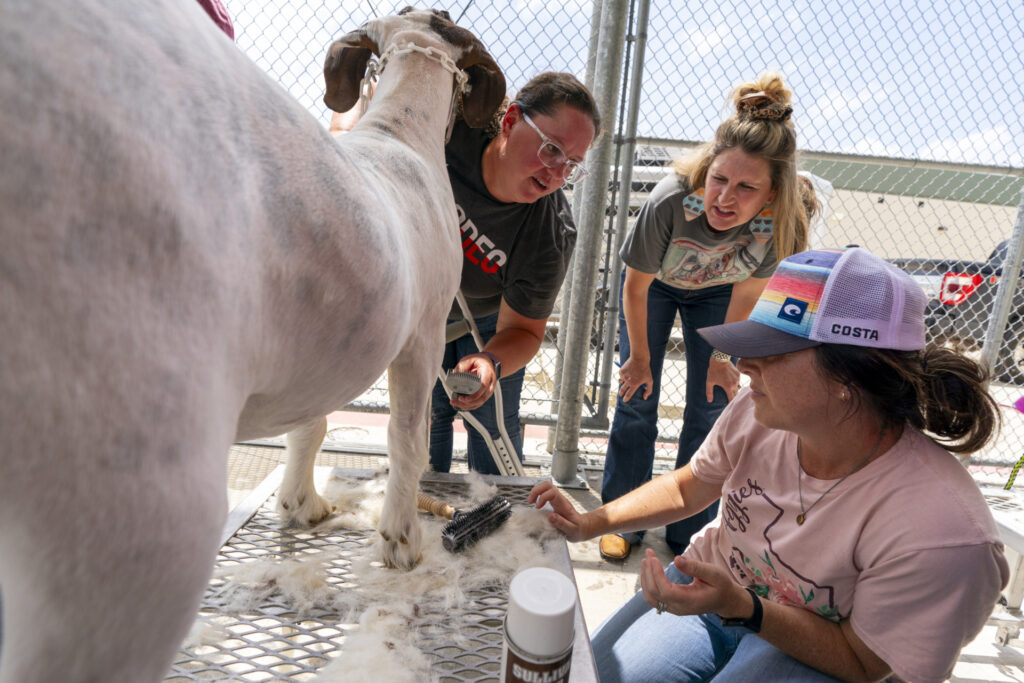The 2023 Summer Ag Academy offers a full buffet of continuing education for high school agriculture teachers nationwide.
Whether welding, floral design, wildlife and range management or curriculum development, the week-long event led by the Department of Agricultural Leadership, Education and Communications at Texas A&M College of Agriculture and Life Sciences provided high-demand programming for 375 participants from around Texas and the nation.
The summer academy was held at the Agriculture and Workforce Education Center on the Texas A&M-RELLIS campus, a 2,400-acre applied research campus in Bryan. Topics covered during the week included sheep and goats, horticulture, proficiency planning, veterinary science and more.
“This is just a fantastic program,” said Brian Kanter, agriculture teacher at Hemet High School in Hemet, California. “The classes are extremely informative and well run. You couldn’t ask for anything better.”
‘Lifetime warranty’ for agricultural education
Ag teachers, many who are former students from the College of Agriculture and Life Sciences, return each summer for continuing education and to enhance their teaching skills or learn a new skill.
“When we think about the goal of the Summer Ag Academy, teachers and teaching are no different regarding the importance of continuing education and adoption of new technology,” said Randy Lund, Ph.D., instructional professor in the Department of Agricultural Leadership, Education and Communications. “As teachers, we always need to continually hone our skills. Within the College of Agriculture and Life Sciences, we pride ourselves on the fact that our degree has a lifetime warranty, and we are a partner for our former students throughout their careers.”

However, the event is not exclusive to former students. The Summer Ag Academy welcomed teachers from across the country, including California, Florida, Indiana and Oklahoma.
The increasing demand for ag teachers
Continuing education for teachers is increasingly important, and the demand for ag teachers is growing. According to an American Association for Agricultural Education National Agricultural Education Supply and Demand Study, 17.5% of the nation’s agriculture teachers retired in 2020.
Furthermore, Lund explained that state lawmakers are requiring more professional certifications among higher education, and they are attempting to fulfill this need through many of the Summer Ag Academy offerings.
“A major push that we have seen come from the Texas Legislature and Texas Education Agency is the idea of industry-based certification,” Lund said. “School districts across Texas are measured by College and Career Military Readiness, CCMR. And, one of the ways schools and teachers can document and earn credit for CCMR for the students is to document that they have earned an industry-based certification.”
These requirements also better prepare students with certifications and training for successful careers in specific trade industries upon graduation.
An influential and incredible program
“This is just an incredible program,” said Hailey Browning ’19, a Texas A&M agricultural science former student and agriculture teacher at Fredericksburg High School. “It’s a great resource of information. This type of instruction within this setting and amazing facilities, I wouldn’t miss it for anything in the world.”
It comes as no surprise that those classes fill up quickly, given the popularity and increased need.
Another ag teacher, Erik King, who teaches at Bowie High School, said, “I feel so much more confident in my teaching after having the hands-on experience. I understand the elements so much more clearly. I learn by doing.”
A diverse array of workshops and topics
The Summer Ag Academy is led by agricultural experts from the Department of Agricultural Leadership, Education and Communications, who bring in experts from across the College of Agriculture and Life Sciences to provide a holistic learning opportunity.
For example, David Reed, Ph.D., associate dean for graduate programs and faculty development in the Department of Horticultural Sciences, was brought in to lead a session on the basics of propagation, which included talking points related to both soil health management and water quality.
“If you get into horticulture, it’s incredibly production-intensive,” he said. “Sustainability is a major topic right now among producers. It’s very enlightening to have all of these teachers returning with great interest, good questions and dialogue. Everything we discussed here filters back through their school classrooms and students.”
Erik King ’16, an ag teacher at Bowie High School, said the course and its hands-on experience gave him more confidence in the classroom. King graduated with a bachelor’s degree in ecosystem science management and a master’s degree in education and horticulture from Texas A&M and attended the course for continuing education credit.
“If I’d known about this academy sooner, I would have taken part,” he said. “My main goal after finishing the academy is to give my students a sense of stability. No matter what you do, you may want to do something plant-related later in life.”
To learn more about the continuing education opportunities offered by the Department of Agricultural Leadership, Education and Communications, visit https://alec.tamu.edu/.
*Additional reporting for this story was provided by Fatyma Lawal, part of the Science Influencers program in the Department of Agricultural Leadership, Education and Communications.
-30-
Credit: Source link
